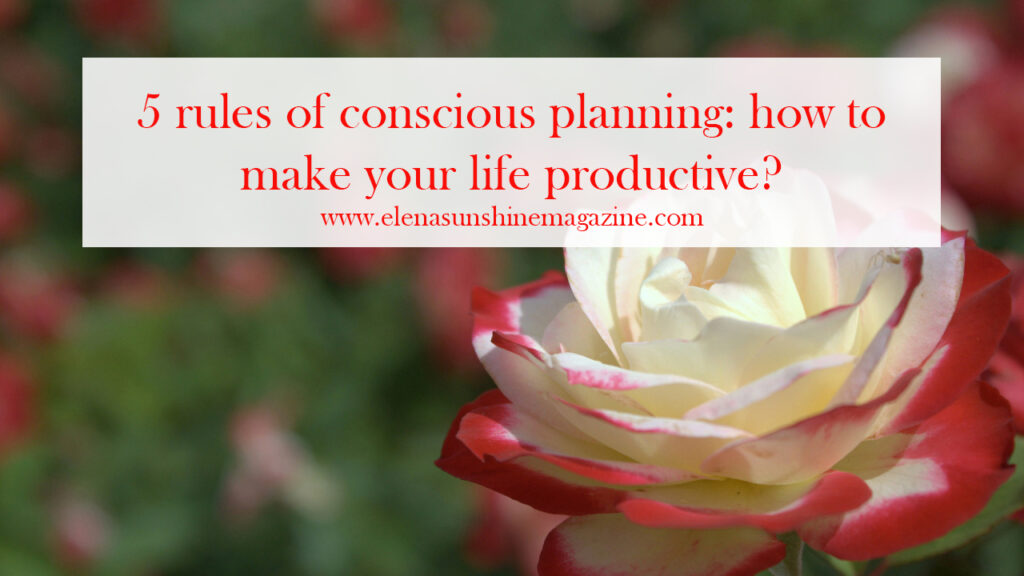We are used to building daily or long-term plans around pressing tasks, business and personal meetings, and all sorts of things. Every day we overload our to-do list, and then again we postpone what we have planned and move it to a new list. 5 rules of conscious planning how to make your life productive.
As a result, we are held hostage by our own plans and are looking for a new time management system, hoping that it will cope more successfully than the previous one. Conscious planning is significantly different from the usual task lists, as it sets different goals and leads to different results.
In order to start planning consciously, I suggest that we ask the question in a new way: instead of the obvious “How to plan?”, we ask “What to plan?»:
#1. Sensations
Time is made up of individual moments, and moments are filled with sensations. So they escape our attention. The days lose their brightness and become similar to one another.
The ability to live your feelings is the first step to awareness. Life will be filled with vivid visual images, touches, and tastes, just notice them.

Imagine how in the morning you will inhale the smell of a freshly washed towel or how the heat from a cup of coffee will pass into your hands. Plan for yourself these moments, stop for a second, breathe in, and touch. Feel it.
The sensations that you plan for yourself, we will call conscious beacons. As before, from one task to another, now we will go from one beacon to another.
#2 Emotions
There are repeated sequences of emotions each day. A certain time or activity is colored by a perception that is positive, negative, or neutral.
If we include the experiences in the plan, it will be easier for us to cope with them. The mind will be ready for negative emotions, which will help you live and let them go. In turn, joyful feelings will not go unnoticed.
Remember your sequences of experiences, and track your personal emotional stimuli. Expected experiences are emotional beacons in conscious planning.

#3 Perception. 5 rules of conscious planning how to make your life productive.
Knowing the repetitive sequences of emotions, you can rearrange your perception of individual situations, if you include in the plan the study of the perception of problematic moments. The key task of conscious planning is to focus on what usually eludes you.
Mindfulness helps you to rest when you tend to fall into mental traps and learn to control your emotional reactions. In order not to become a hostage of your own emotions, you must, first of all, be aware of them. Without this, it is impossible to manage them effectively.
#4. Impressions
Many experiences may never happen if you don’t plan them. The visualization technique will help you plan your impressions. Imagine standing on the ocean, feet up to your ankles in the surf. As individual drops of water reach your face, the waves roar.

Or maybe you can imagine that the long-awaited spring has come to the city. The air smells of fresh paint from the curbs and benches. It’s still very early in the morning, and you go out for a run.
It is more convenient to plan impressions at the beginning of a large period, for example, with the onset of the new year: pay attention to the beacons of impressions for the year, return to your ideas, supplement them with new ideas, and follow the planned plan.
#5 Priorities. 5 rules of conscious planning how to make your life productive.
Mindfulness implies maximum engagement in the present moment. Planning priorities will help you avoid the trap of being ahead of time. When we are focused on future events, we do not notice what is happening to us now. Both during the day and on the scale of a year or a lifetime.
Identify your priorities and remind yourself of them whenever you find yourself thinking ahead. You will set “priority beacons” for individual days, weeks, and the whole year. So what you are doing becomes a priority for you, and other tasks are waiting in the wings.
It is most convenient to plan feelings, emotions, and changes in perception in a personal diary.
Think through the emotional and conscious beacons for the next day and then remember what you felt did not pass by your consciousness. Conscious planning helps you learn how to work with your emotions.
To get rid of an experience means to live it and open up to the next feeling. Keeping a diary will help you do your inner work. But I advise you to devote a special section of your secret notebook to your impressions and priorities. And be sure to date and re-read your notes.

Conscious planning will help you focus your attention on everyday processes. The autopilot mode will turn off, and you will feel the control shift into your hands. There will be a real opportunity to get out of the repeated mental traps and change your attitude toward what is happening.
Over time, you will learn to carefully live your feelings and emotions. Daily conscious planning will be replaced by free communication with the diary. And don’t forget to write down your future impressions and priorities. This will become a good habit for life.
The main thing to remember is the energy of emotions. Once it arises, it must find a way out.



